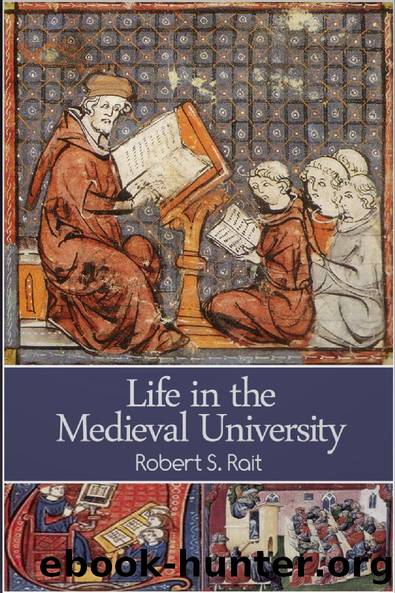Life in the Medieval University by Robert S. Rait

Author:Robert S. Rait
Language: eng
Format: epub, mobi
Tags: history of, medieval, mediaeval, medeval, uni, school, oxford, cambridge, oxbridge
ISBN: 9781781666852
Publisher: Andrews UK Limited 2012
Published: 2012-06-15T00:00:00+00:00
CHAPTER V
UNIVERSITY DISCIPLINE
The growing tradition of strict college discipline ultimately led to disciplinary statutes in the universities. From very early times, universities had, of course, made regulations about the curriculum, and the border-line between a scholar's studies and his manners and morals, could not be absolutely fixed. At Paris, indeed, it is not until the fifteenth century that we find any detailed code of disciplinary statutes; but fourteenth-century regulations about dress were partly aimed at checking misdeeds of students disguised as laymen, and in 1391 the English Nation prohibited an undue number of "potationes et convivia," in celebration of the "jocund advent" of a freshman or on other occasions. It was not till the middle of the fifteenth century that the University of Paris, awoke to the realisation of its own shortcomings in manners and morals; Cardinal William de Estoutville was commissioned by Nicholas V. to reform it, and internal reform, the necessity of which had been recognised for some years, began about the same time with an edict of the Faculty of Arts ordering a general improvement, and especially forbidding the celebration of feasts "cum mimis seu instrumentis altis." Estoutville's ordinances are largely concerned with the curriculum, he was at least as anxious to reform the masters as the pupils, and his exhortations are frequently in general or scriptural terms. The points of undergraduate discipline on which he lays stress are feasting, dressing improperly or wearing the clothes of laymen, quarrelling, and games and dances "dissolutas et inhonestas." Four masters or doctors are to inspect annually the colleges and pedagogies, in which the students live, and are to see that proper discipline is maintained. From time to time, similar regulations were made by the Faculty of Arts, e.g. in 1469, it is ordered that no student is to wear the habit of a fool, except for a farce or a morality (amusements permitted at this period). Any one carrying arms or wearing fools' dress is to be beaten in public and in his own hall. These last regulations are doubtless connected with town and gown riots, for which the Feast of Fools afforded a tempting opportunity.
The absence of disciplinary regulations in the records of the University of Paris, is largely to be explained by the fact that criminal charges against Parisian scholars were tried in the Bishop's Court, and civil actions in the Court of the Provost of Paris. At Oxford, where the whole jurisdiction belonged to the Chancellor of the University, disciplinary statutes are much more numerous. We find, from the middle of the thirteenth century onwards, a series of edicts against scholars who break the peace or carry arms, who enter citizens' houses to commit violence, who practise the art of sword and buckler, or who are guilty of gross immorality. A statute of 1250 forbids scholars to celebrate their national feast days disguised with masks or garlands, and one of 1313 restricts the carrying of arms to students who are entering on, or returning from, long journeys.
Download
Life in the Medieval University by Robert S. Rait.mobi
This site does not store any files on its server. We only index and link to content provided by other sites. Please contact the content providers to delete copyright contents if any and email us, we'll remove relevant links or contents immediately.
Fanny Burney by Claire Harman(25806)
Empire of the Sikhs by Patwant Singh(22199)
Out of India by Michael Foss(16323)
Leonardo da Vinci by Walter Isaacson(11940)
Small Great Things by Jodi Picoult(6119)
The Six Wives Of Henry VIII (WOMEN IN HISTORY) by Fraser Antonia(4808)
The Wind in My Hair by Masih Alinejad(4436)
The Lonely City by Olivia Laing(4136)
The Crown by Robert Lacey(4123)
A Higher Loyalty: Truth, Lies, and Leadership by James Comey(4049)
The Iron Duke by The Iron Duke(3661)
Millionaire: The Philanderer, Gambler, and Duelist Who Invented Modern Finance by Janet Gleeson(3589)
Sticky Fingers by Joe Hagan(3463)
Alive: The Story of the Andes Survivors by Piers Paul Read(3329)
Papillon (English) by Henri Charrière(3288)
Joan of Arc by Mary Gordon(3279)
Stalin by Stephen Kotkin(3101)
Aleister Crowley: The Biography by Tobias Churton(3037)
Ants Among Elephants by Sujatha Gidla(2936)
